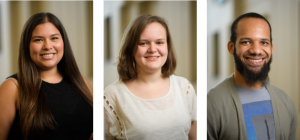Presented By: Department of Psychology
Social Brown Bag:
Julisa Lopez, Amelie Rossmaier and Imani Burris

Julisa Lopez
Title
Racialized Representations: Differences in the Acceptability of Redface and Blackface
Abstract
There have been several high-profile instances of individuals being called out and sanctioned for the use of racialized representations -- representations that reflect stereotypical, caricaturizations of racial groups, such as blackface and redface. Notably, the incidents which led to the fiercest backlash were instances of blackface. Indeed, from 2014 to 2019, 104,097 news article titles included the term “blackface”, while only 614 news article titles include the term “redface”. This is especially concerning given the voracity at which Native people protest the continued use of redface every sport season. The current research explores how the lack of understanding of the lived experiences of Native people (i.e., viewing Natives as frozen in the past, denying Natives experiences with discrimination and racism) helps explain why blackface is understood as unacceptable, while redface is given far less attention and incur less social disapproval.
Amelie Rossmaier
Title
Do people conform more with the group during the COVID-19 pandemic?
Abstract
The current pandemic poses a threat to virtually everyone while producing enormous uncertainty in life. According to classic theories of social influence, the combination of an external threat and uncertainty should foster conformity to majority views. Here, we tested this possibility by taking advantage of a study on conformity of attitudes conducted in the fall of 2019 on a group of American undergraduates. We repeated this study in April 2020 during the pandemic. As predicted, we observed a significant increase of attitude shifts toward the national means during the pandemic, compared to the pre-pandemic period. We will discuss reasons for and possible implications of this effect and look at other factors that might make us conform more or less.
Imani Burris
Title
Challenge Mindset: Leveraging Adversity as a Source of Strength
Abstract
Although adversity often undermines long-term wellbeing, successfully making meaning of adversity (i.e., understanding why adversity occurs) mitigates these negative effects. In the current work, I propose challenge mindset (i.e., the belief that adversity creates opportunities for personal growth and functions as a source of strength to confront future challenges) as a form of successful meaning-making. In particular, I theorize that endorsing a challenge mindset helps people cope with and, when possible, overcome adverse experiences. In this talk, I present two correlational studies (N = 522), which provide empirical evidence that challenge mindset is a reliable and valid construct. Further, I show that challenge mindset endorsements are meaningfully related to past and ongoing adverse experiences, as well as the use of adaptive coping strategies. I conclude my talk by discussing next steps and the practical implications of challenge mindset endorsements.
Title
Racialized Representations: Differences in the Acceptability of Redface and Blackface
Abstract
There have been several high-profile instances of individuals being called out and sanctioned for the use of racialized representations -- representations that reflect stereotypical, caricaturizations of racial groups, such as blackface and redface. Notably, the incidents which led to the fiercest backlash were instances of blackface. Indeed, from 2014 to 2019, 104,097 news article titles included the term “blackface”, while only 614 news article titles include the term “redface”. This is especially concerning given the voracity at which Native people protest the continued use of redface every sport season. The current research explores how the lack of understanding of the lived experiences of Native people (i.e., viewing Natives as frozen in the past, denying Natives experiences with discrimination and racism) helps explain why blackface is understood as unacceptable, while redface is given far less attention and incur less social disapproval.
Amelie Rossmaier
Title
Do people conform more with the group during the COVID-19 pandemic?
Abstract
The current pandemic poses a threat to virtually everyone while producing enormous uncertainty in life. According to classic theories of social influence, the combination of an external threat and uncertainty should foster conformity to majority views. Here, we tested this possibility by taking advantage of a study on conformity of attitudes conducted in the fall of 2019 on a group of American undergraduates. We repeated this study in April 2020 during the pandemic. As predicted, we observed a significant increase of attitude shifts toward the national means during the pandemic, compared to the pre-pandemic period. We will discuss reasons for and possible implications of this effect and look at other factors that might make us conform more or less.
Imani Burris
Title
Challenge Mindset: Leveraging Adversity as a Source of Strength
Abstract
Although adversity often undermines long-term wellbeing, successfully making meaning of adversity (i.e., understanding why adversity occurs) mitigates these negative effects. In the current work, I propose challenge mindset (i.e., the belief that adversity creates opportunities for personal growth and functions as a source of strength to confront future challenges) as a form of successful meaning-making. In particular, I theorize that endorsing a challenge mindset helps people cope with and, when possible, overcome adverse experiences. In this talk, I present two correlational studies (N = 522), which provide empirical evidence that challenge mindset is a reliable and valid construct. Further, I show that challenge mindset endorsements are meaningfully related to past and ongoing adverse experiences, as well as the use of adaptive coping strategies. I conclude my talk by discussing next steps and the practical implications of challenge mindset endorsements.